Why Is HIPAA Security Awareness Training Essential
HIPAA security awareness training is not just a legal requirement; it's an important practice to protect patient information in the healthcare industry. HIPAA training ensures that all employees understand the importance of HIPAA, learn to manage patient data securely, and are prepared to prevent data breaches.
In 2026, keeping patient information safe is more important than ever. So, why is HIPAA important? It is important because it's all about keeping patient information safe and private.
HIPAA security awareness training is a must-do for anyone who deals with health records. Imagine if someone's private health details leaked because of a simple mistake. That could be a disaster, right?
Here are 5 key statistics highlighting the importance of HIPAA awareness training in preventing data breaches, reducing costs, and ensuring compliance in healthcare:
- Approximately 80% of healthcare data breaches involve a human element, such as falling for phishing emails or improper handling of PHI, which can often be prevented through proper employee education and awareness.
- The average cost of a data breach in the healthcare sector is $10.93 million, underscoring the financial risks of inadequate training that leads to violations or exposures.
- Nearly one in four (25%) healthcare workers are not provided with essential security awareness training, leaving significant gaps that increase the likelihood of unintentional breaches or non-compliance.
- HIPAA violation penalties can range from $100 to $50,000 per incident, depending on severity, making regular training crucial to avoid hefty fines from regulatory enforcement.
- Only about 30% of organizations conduct phishing simulations as part of their training, contributing to higher vulnerability since phishing is a common entry point for breaches that training can effectively address.
These examples illustrate the critical importance of comprehensive HIPAA security awareness training to protect healthcare organizations from substantial financial penalties, operational setbacks, and damage to their reputation.
Getting Started with HIPAA Security Awareness Training
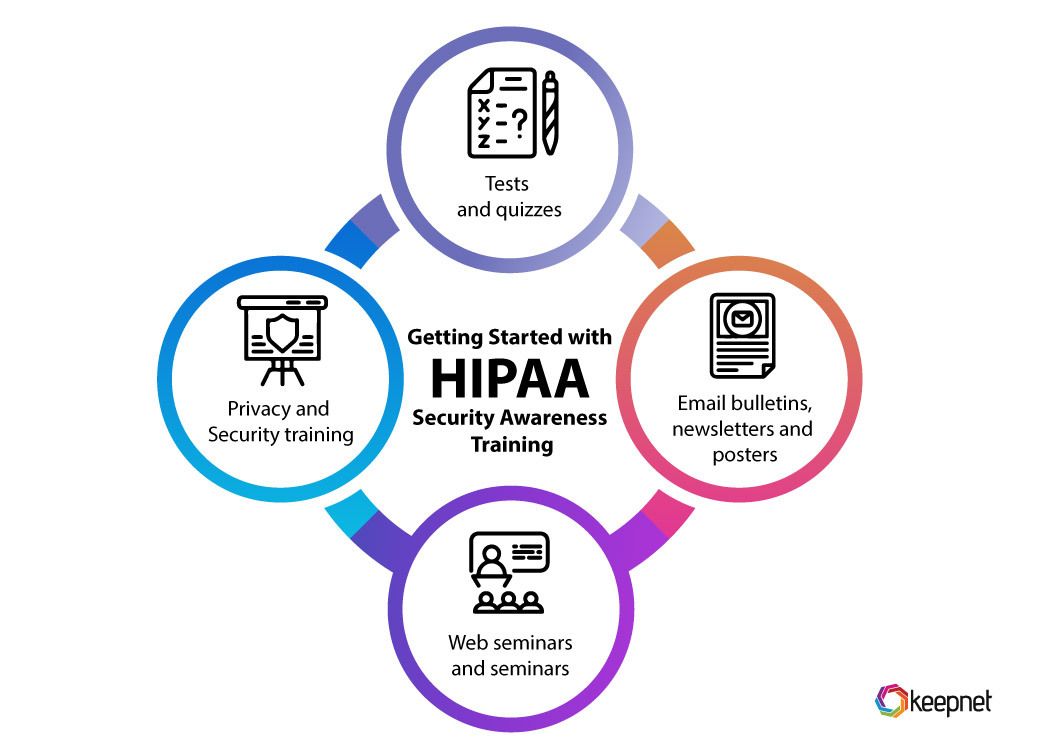
Getting started with HIPAA employee training may seem challenging, but getting started on the right foot is important. Understanding what HIPAA security awareness training is and what it involves is the first step.
HIPAA, or the Health Insurance Portability and Accountability Act, is of great importance in the healthcare sector. HIPAA training is designed to ensure that everyone is on the same page when it comes to protecting patient information, whether you're a healthcare provider, an administrator, or working in billing.
The starting point is often simple: enroll in a comprehensive HIPAA employee training program. From there, you can learn the basics of data protection, such as using strong passwords and managing patient records securely. Think of it as learning the rules of the road before driving; HIPAA security awareness training equips you with the knowledge you need to be a responsible steward of health information.
Who needs to be in compliance with HIPAA?
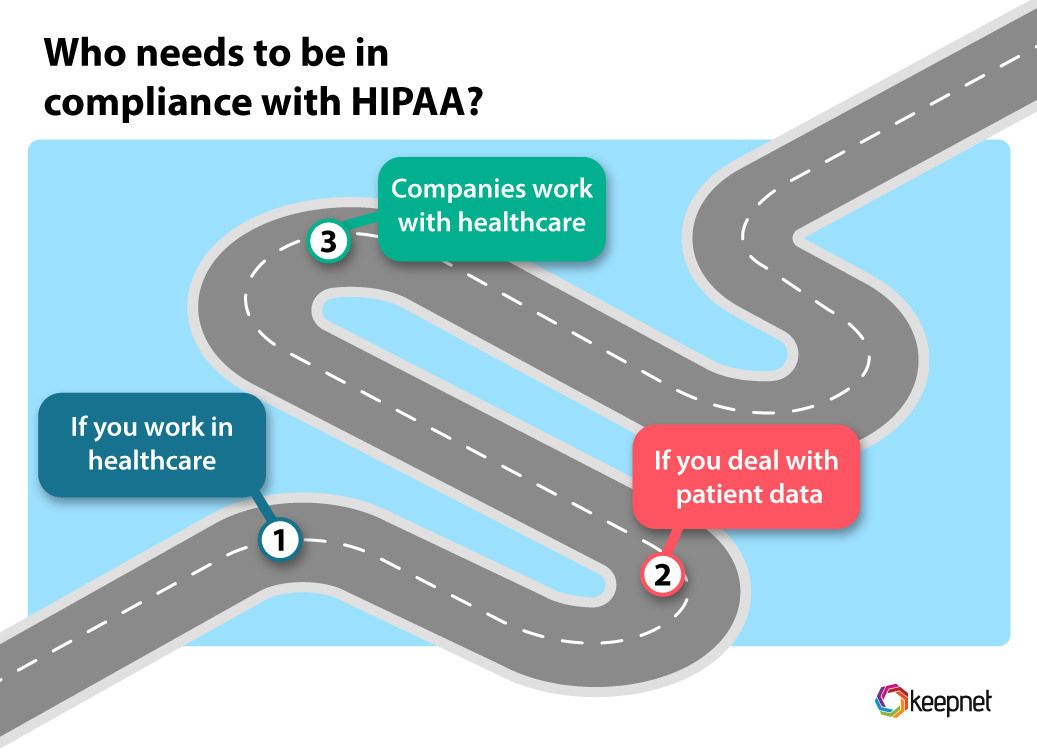
So, who really needs to follow HIPAA rules? Basically, if you work in healthcare or deal with health records, you need to pay attention. This includes doctors, nurses, and anyone working at a hospital or clinic.
But it's not just them. If you're part of a team that handles health info in any way, like billing or making appointments, HIPAA is for you too.
Even companies that work with these health people, like software providers, need to follow these rules. It's all about making sure that when someone trusts us with their health information, we keep it safe and private.
Download our free phishing awareness training.
The Role of Security Awareness Training in HIPAA Compliance
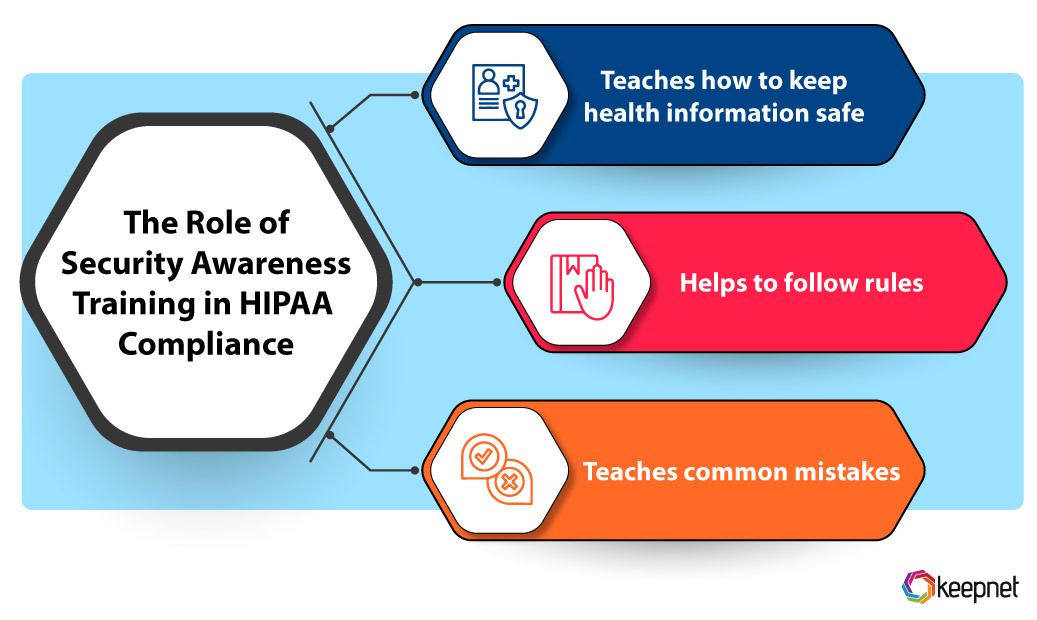
Think of HIPAA security awareness training as learning how to keep a secret, a very important one. Training teaches everyone who works with health information how to protect it. This is about more than just following rules because we have to. It's about understanding why these rules matter.
The HIPAA security awareness training covers how to avoid common mistakes that could lead to information leaks. It's like learning to lock the door and close the windows before leaving your house. The goal is to make sure everyone knows how to keep patient information safe from prying eyes.
5 Reasons Why HIPAA Training is Essential
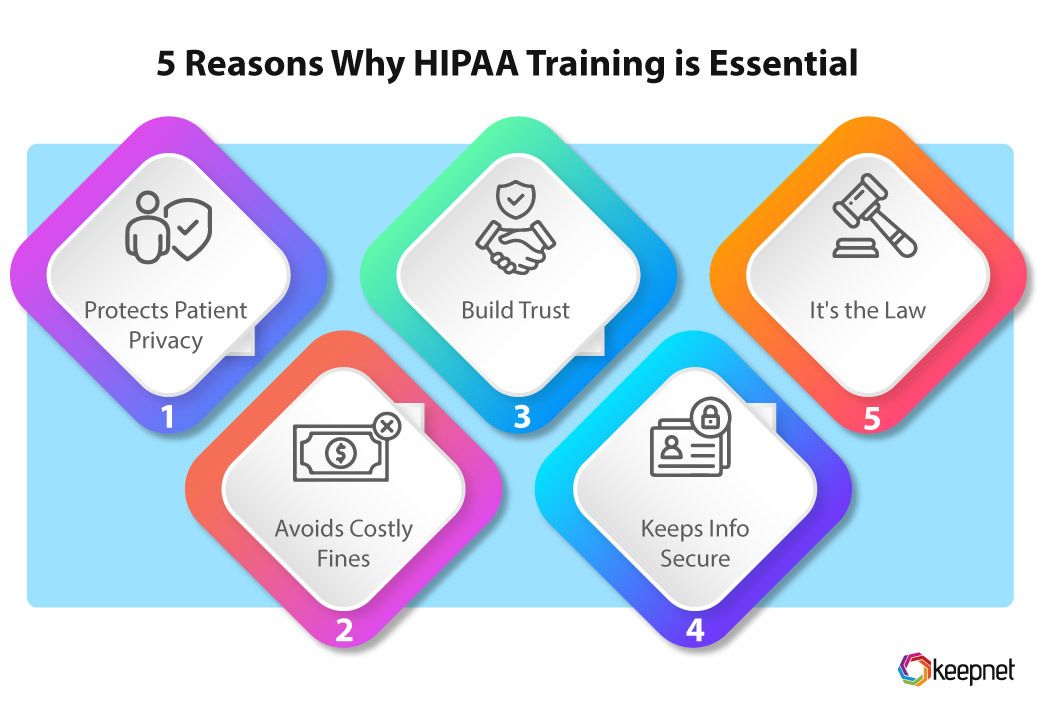
Ensuring HIPAA compliance goes beyond just following regulations—it's about protecting patients, building trust, and upholding the integrity of healthcare practices. Here are five key reasons why HIPAA training is a must for all healthcare professionals:
- Protects Patient Privacy: First and most importantly, HIPAA training keeps patient information private. It's all about making sure that someone's health info doesn't end up in the wrong hands.
- Avoids Costly Fines: If we don't follow HIPAA rules, the penalties can be huge. We're talking about fines that can really hurt a hospital or clinic. HIPAA security awareness training helps avoid these fines by keeping everyone in line with the law.
- Builds Trust: When patients know their information is safe, they trust their healthcare providers more. This trust is key to getting patients the care they need.
- Keeps Info Secure: HIPAA training teaches us about the latest ways to keep information secure, from strong passwords to avoiding phishing scams.
- It's the Law: Lastly, following HIPAA is not optional; it's the law. HIPAA security awareness training ensures that everyone knows what they need to do to comply with these legal requirements.
HIPAA training for employees isn't just another task to check off; it's an essential part of working in healthcare. It keeps patients safe, avoids fines, and builds a culture of trust and security.
Who Should Receive HIPAA Training?
Everyone in the healthcare game needs HIPAA security awareness training. If you're a doctor, nurse, or any kind of healthcare worker, you're in. But it's not just them. Office folks handling patient files, billing, or appointments need it too.
Even if you're working with a healthcare place but not directly in it, like IT support or cleaning services, you need to know HIPAA. It's all about making sure everyone who might see patient info knows how to keep it safe.
Consequences of Non-Compliance with HIPAA
Non-compliant with HIPAA regulations? Be prepared for severe consequences. Heavy fines are on the table, enough to put a significant economic burden on a clinic or hospital. In addition, there is a risk of damage to your reputation.
Customers may seek services elsewhere if it becomes known that their information is not being protected. In extreme cases, individuals could even face jail time for serious breaches. Ensuring the confidentiality of patient information is extremely important.
Key Components of HIPAA Security Awareness Training
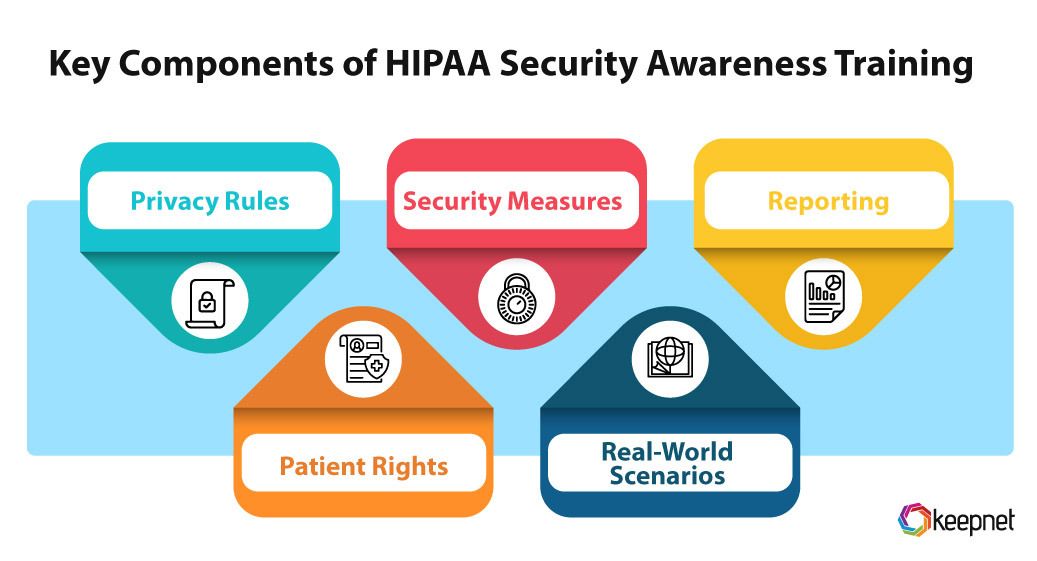
HIPAA training isn't just a bunch of rules. It's about understanding how to keep information safe. Here are the big things it covers:
- Privacy Rules: This is the heart of HIPAA. It's all about who can see or share patient information and when.
- Security Measures: Here, we learn about protecting digital info. Think passwords, encryption, and safe internet use.
- Reporting: Knowing how to report it quickly is key if something goes wrong, like a lost file or a hack.
- Patient Rights: Patients have rights over their info, like getting copies or knowing who's seen it. HIPAA security awareness training makes sure everyone respects these rights
- Real-World Scenarios: The best training gives examples or situations you might actually face. This way, you're ready for anything.
How Keepnet Maintain the HIPAA Compliance
Keepnet takes HIPAA compliance seriously and ensures its security practices are top-notch. We offer a comprehensive AI-powered security awareness training program that keeps their employees well-informed and prepared against various cyber threats. Here’s how we do it:
- Phishing Awareness: We provide free phishing awareness courses and help companies to run phishing simulations through emails, phone calls, SMS, MFA, and even QR codes to teach employees how to spot and handle social engineering attacks. This includes everything from spotting phishing emails to not falling for scam phone calls or texts.
- Continuous Learning: We ensure HIPAA security awareness training material is always up-to-date, covering the latest phishing tactics and security practices. We provide over 500 courses in more than 30 languages, including interactive videos and game-based learning, to make the training engaging and effective.
- Easy Integration and Accessibility: Our system integrates smoothly with existing company systems, and we offer training that can be accessed through SMS, making it easier for all employees to participate, regardless of their role or location.
- Engagement and Reporting: Through gamification and leaderboards, training becomes a more engaging experience. We also have a phishing reporter add-in that allows employees to easily report suspicious emails, helping to increase vigilance and response rates.
- Regulation Ready: Training also covers essential regulations not only HIPAA, but also other regulations like GDPR. This ensures employees understand the legal aspects of data protection and compliance.
- Customizable and Realistic Training: Keepnet Labs offers customizable phishing scenarios, using AI to create realistic multi channel phishing simulations. This approach helps employees confidently face real-world phishing email examples.
- Support and Analytics: With multilingual support and automated reporting, Keepnet keeps track of training progress and effectiveness, making sure that every team member is up to speed and secure in their knowledge.
Final: HIPAA Security Awareness Training
HIPAA training isn't just another box to tick; it's a must-do for keeping patient info safe. It's about learning the rules of the game and how to play it safe with health information.
HIPAA security awareness training touches on everything from privacy laws to how to handle a data oopsie. The big goal? To make sure everyone feels confident and clear on how to protect patient privacy.
It's like learning the rules of the road before you drive. And just like driving, everyone needs to stay updated on the rules to keep things running smoothly. HIPAA training is there to make sure that happens, keeping everyone on track and in the know.
Watch Keepnet's YouTube video and explore a variety of training content, learn to schedule and send them with ease, and even create your HIPAA-compliant training content.
Editor’s Note: This article was updated on December 24, 2025.